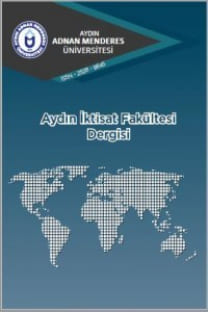MUHASEBE MESLEK MENSUPLARININ CORONAFOBİ ALGISI ÜZERİNE BİR ALAN ARAŞTIRMASI
Tüm dünyayı etkisi altına alan COVID-19 hastalığı, dünyanın yaşadığı küresel zorluklardan biri olarak literatürdeki yerini almıştır. COVID-19 hastalığının klinik tedavisi için birçok aşı geliştirilirken bu hastalığın yarattığı psikososyal etkileri tedavi etmek için henüz bir adım atılmamış, hastalığın bu yönü henüz tam olarak ele alınmamıştır. Çalışmada, Adana ilinde faaliyet gösteren muhasebe meslek mensuplarının; koronavirüs hastalığına karşı korku düzeylerini tespit etmek ve bu konuya yönelik algıların demografik değişkenler açısından farklılık gösterip göstermediğini belirlemektir. Elde edilen veriler incelendiğinde; örnekleme dahil edilen meslek mensuplarının COVID-19’dan oldukça korktukları, bu hastalığı düşünmenin bile rahatsızlık verici olduğunu düşündükleri, hastalıktan ötürü hayatlarını kaybetmekten korktuklarını, hastalığa yakalandıklarını düşündüklerinde çarpıntı yaşadıkları görüşüne ulaşılmıştır. Çalışmadan elde edilen bir diğer sonuç ise muhasebe meslek mensuplarının koronavirüs hastalığına karşı korku düzeylerinin cinsiyet, unvan, eğitim durumu ve yaş faktörleri açısından farklılık gösterdiğidir. Çalışmanın ele alınan perspektiften daha önce incelenmemiş olması önemini ve değerini arttırmaktadır.
Anahtar Kelimeler:
COVID-19, MUHASEBE, MUHASEBE MESLEK MENSUPLARI
A FIELD RESEARCH ON THE PERCEPTION OF CORONAFOBIA OF ACCOUNTING PROFESSIONALS
The COVID-19 disease, which emerged in December 2019 and affected the whole world in a short time with a great spread rate, has taken its place in the literature as one of the global difficulties experienced by the world. While many vaccines are being developed for the clinical treatment of COVID-19 disease, no steps have been taken to treat the psychosocial effects of this disease, and this aspect of the disease has not yet been fully addressed. In the study, accounting professionals operating in Adana province; The aim of this study is to determine the fear levels against the coronavirus disease and to determine whether the perceptions regarding this issue differ in terms of demographic variables. When the obtained data are examined; It has been concluded that the professionals included in the sample are very afraid of COVID-19, they think it is uncomfortable even to think about this disease, they are afraid of losing their lives due to the disease, and they experience palpitations when they think that they have the disease. Another result obtained from the study is that the level of fear of the accountants against the coronavirus disease differs in terms of gender, title, educational status and age factors. The fact that the study has not been examined from the perspective discussed before increases its importance and value.
Keywords:
COVID-19, ACCOUNTING, ACCOUNTING PROFESSIONALS,
___
- Akın, O. ve Özdaşlı, K. (2014). ‘‘Muhasebe Meslek Mensuplarının Mesleki Faaliyetlerinde Uymaları Gereken Etik İlkelere Uyma Düzeyine Yönelik Meslek Mensupları İle Meslek Yüksek Okulu Muhasebe Bölümü Öğrencilerinin Algıları’’, Muhasebe ve Finansman Dergisi, (63): 59-74.
- Bekaroğlu, E. ve Yılmaz, T. (2020). ‘‘COVID-19 ve Psikolojik Etkileri: Klinik Psikoloji Perspektifinden Bir Derleme’’, Nesne, 8(18): 573-584.
- Cengiz, Ö. (2008). ‘‘SM ve SMMM Mesleği’’, Http://www.Muhasebetr.Com/Yazarlarimi z/Ozkan/006/ (22.02.2022).
- Cohen, L. Manıon, L. ve Morrıson. K. (2017). Research Methods in Education, 8.Ed., Routledge Falmer, Londra, 945s.
- Dong, L., Hu, S., ve Gao, J. (2020). ‘‘Discovering drugs to treat coronavirus disease 2019 (COVID-19)’’, Drug Discoveries & Therapeutics, 14(1): 58–60.
- Guan, W. J., Ni, Z. Y., Hu, Y., Liang, W. H., Ou, C. Q., He, J. X. Ve Du, B. (2020). ‘‘Clinical characteristics of coronavirus disease 2019 in China’’, New England Journal of Medicine, 382:1708-1720.
- World Health Organization (2020). ‘‘Coronavirus disease (COVID-2019): Situation report-54’’, URL: https://www.who.int/docs/default-source/coronaviruse/situation-reports/20200314-sitrep-54-covid-19.pdf?sfvrsn=dcd46351_2.
- Huang, C., Wang, Y., Li, X., Ren, L., Zhao, J., Hu, Y. (2020). ‘‘Clinical features of patients infected with 2019 novel coronavirus in Wuhan, China’’, The Lancet, 395(10223): 497–506.
- Ladikli, N., Bahadır, E., Yumuşak, N., Akkuzu, H., Karaman, G. ve Türkkan, Z. (2020). ‘‘Kovid-19 Korkusu Ölçeği’nin Türkçe Güvenirlik Ve Geçerlik Çalışması’’, International Journal of Social Science,3(2): 71-80.
- Lin, C. (2020). ‘‘Social reaction toward the 2019 novel coronavirus (COVID-19)’’, Social Health and Behavior, 3(1): 1–2.
- Öndeş, T. (2012). ‘‘Genel Muhasebe’’, Atatürk Üniversitesi Açıköğretim Fakültesi, 1-134.https://www.cag.edu.tr/uploads/site/lecturer-files/ataturk-universitesi-ebook-ERRz.pdf
- Sağlık, K. ve Duygun, A. (2021). ‘‘Tüketicilerin Seyahat Tercihleri İle Koronafobi Düzeyleri Arasındaki İlişkinin İncelenmesi’’ İzmir Sosyal Bilimler Dergisi, 3(1): 96-105.
- Şıtak, B. (2021). Dijitalleşmenin Muhasebe Mesleğine, Muhasebe Meslek Mensuplarına ve Muhasebe-Finans Eğitimine Etkilerinin Salgın Hastalık Döneminde İncelenmesi, Kahramanmaraş Sütçü İmam Üniversitesi, Sosyal Bilimler Enstitüsü, İşletme Anabilim Dalı, Kahramanmaraş.
- T.C. Sağlık Bakanlığı, 2022. Covid-19 Aşısı Bilgilendirme Platformu, (https://covid19asi.saglik.gov.tr/)
- Tanış, V. ve Yanık, G. (2021). ‘‘Koronafobinin Karar Verme Tarzları Ve İşe Bağlılık Üzerindeki Etkileri’’, Hacettepe Üniversitesi İktisadi ve İdari Bilimler Fakültesi Dergisi, 39 (3): 459-474.
- Taşpınar, B., Taşpınar, F., Gülmez, H., Kızılırmak, A. (2021). ‘‘Fizyoterapistlerde COVID-19 korkusu ve yaşam kalitesi arasındaki ilişki’’, Forbes J Med, 2(2):108-115.
- Türk Dil Kurumu (2022). ‘‘Güncel Sözlük’’, URL: https://sozluk.gov.tr/ (22.02.2022).
- Wang, D., Hu, B., Hu, C., Zhu, F., Liu, X., Zhang, J. ve Zhao, Y. (2020). ‘‘Clinical characteristics of 138 hospitalized patients with 2019 novel coronavirus–infected pneumonia in Wuhan, China’’, JAMA, 323(11): 1061–1069.
- ISSN: 2528-9845
- Yayın Aralığı: Yılda 2 Sayı
- Başlangıç: 2016
- Yayıncı: Adnan Menderes Üniversitesi
